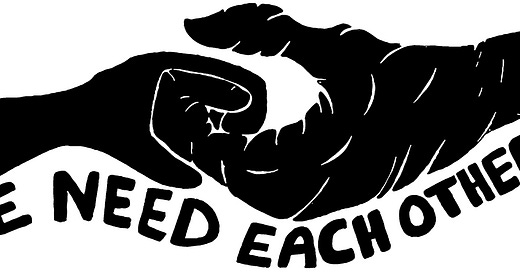Building neighbourhood solidarity and resilience
With the grassroots community projects we promote and do our level best to support, there's one key fundamental and that's generating a sense of neighbourhood solidarity. We're not talking about an exclusive sense of solidarity centred on one particular group - we're talking about the kind that respects the variety of people that go to make up a neighbourhood.
This recognises that while people can be very different from each other, they can all play a role in making a neighbourhood a better place to live. It's the kind of solidarity that our rulers hate because it means people have seen beyond their games of divide and rule aimed at making us nothing more than selfish, atomised, uncaring producers and consumers. It's what we'll need in an increasingly uncertain future as we face rampant food price inflation and possible supply chain disruption down to a range of factors that stretch from geo-political instability through to incompetence.
This is the kind of scenario where life in an atomised neighbourhood where no one knows or trusts their neighbours could start to get uncomfortable. The kind of scenario where neighbourhood resilience cannot happen because everyone is fearful of everyone else. The kind of scenario where the authorities can control us because we fear and can't trust each other. Basically, a nightmare scenario that no caring human wants.
This explains why we support community projects that bring people together, regardless of their backgrounds. At the end of the day, whoever we are and wherever we're from, we all want to live in a neighbourhood where people look out for and care for each other. A neighbourhood that in an age of failing public services can provide networks of support for its more vulnerable members. A neighbourhood that's making steps to take control of its food supply with community gardens/allotments, community food kitchens, food buying groups and the like. A neighbourhood that once it gains a degree of self confidence about looking after itself, will start to ask some searching questions about power, who exercises it and how it has to be brought right down to the grassroots.
So, while At the Grassroots may on the surface seem to be a 'fluffy' project, what we're about is building the new world in the shell of the crumbling one we have to live in at the moment. The key to success in that project is building neighbourhood solidarity and resilience so we can not only survive the challenges of the dysfunctional world we currently live in but we can also start to build the saner, juster and more sustainable one we desire.





